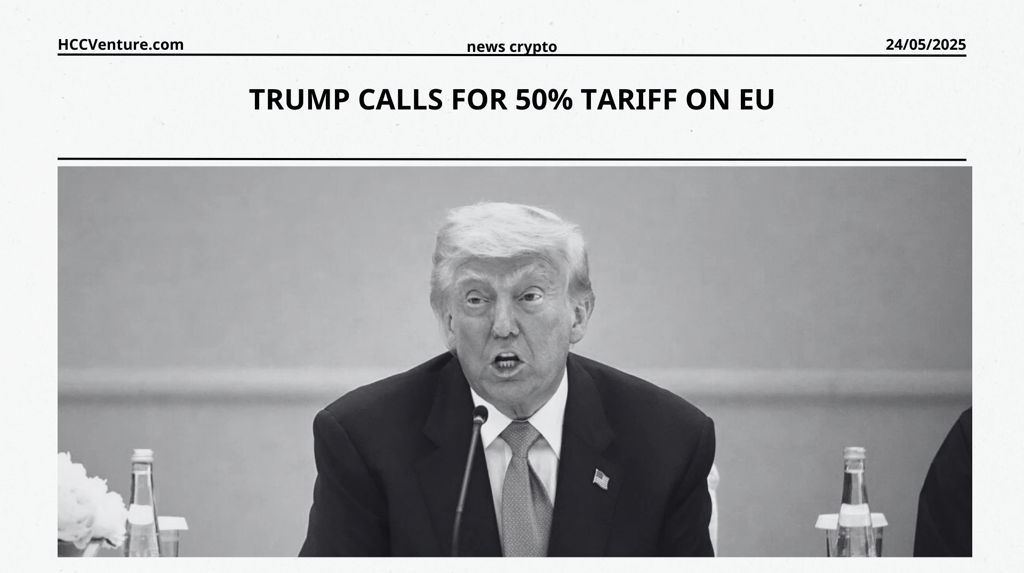Trump calls for 50% tariff on EU, $153 million liquidated overnight
US President Donald Trump announced on the Truth Social platform his intention to impose a 50% tariff on imported goods from the European Union (EU), starting from June 1, 2025. This statement was made in the context of trade negotiations between the US and the EU reaching a deadlock.
5/24/20253 min read


Background to the Tax Proclamation
Trump’s announcement was not a completely unexpected move, but rather part of a series of economic protectionist policies that he has promoted since his first term. In a post on Truth Social, Trump accused the EU of being “formed specifically to take advantage of the United States on trade” and stressed that the trade deficit of more than $250 billion a year between the US and the EU was “unacceptable.” He demanded that goods made in the US be exempted from tariffs, in order to promote domestic production.
Trump had previously announced a “Liberation Day” on April 2, 2025, with “reciprocal” tariffs of up to 10% for all countries and higher tariffs for those deemed “egregious violators,” including the EU, which initially had a 20% tariff. However, the increase to 50% marks a significant escalation, especially as trade talks with the EU have failed to make progress. The Financial Times reported that US Trade Representative Jamieson Greer had rejected recent concessions from the EU, which demanded that the EU unilaterally cut tariffs on US goods.
Immediate impact on financial markets
European stock indexes fell sharply in the immediate aftermath of Trump’s announcement. Germany’s DAX fell 2.6%, France’s CAC fell 2.8%, and Britain’s FTSE fell 1.3% on the same day. The euro also fell against the dollar, while eurozone government bond yields fell on concerns about economic growth. In the United States, stock index futures were also under pressure, with the S&P 500 and Nasdaq facing their biggest first-quarter declines in 2025.
Notably, financial markets saw $153 million in liquidation of long positions, mostly in assets related to international trade and companies that rely on global supply chains. This shows that investors are concerned about the negative impact of tariffs on corporate profits, especially multinational companies with large manufacturing or export operations to the US. Posts on the X platform reflect the market’s uncertainty, with some investors calling it a “perfect storm” as the market’s “safety cushion” is no longer available after recent volatility.
Potential implications for the global economy
The 50% tariff Trump proposed, if implemented, would be one of the most aggressive protectionist measures since the Smoot-Hawley Tariff Act of the 1930s. Potential consequences include:
The EU has a history of responding to Trump’s tariffs. In April 2025, the EU announced plans to impose tariffs on €26 billion of US goods, targeting products such as whisky, before pausing for 90 days to negotiate. With the new 50% tariff, the EU is likely to impose further retaliatory measures, escalating transatlantic trade tensions.
The tariffs would raise the price of goods imported from the EU, from German cars to French wine, directly affecting American consumers. Companies like BMW, already hurt by tariffs on cars imported from Mexico and Canada, may have to further adjust their production strategies or pass the increased costs on to consumers.
Economists, including Federal Reserve Chairman Jerome Powell, have warned that higher tariffs could cause inflation and slow economic growth. Goldman Sachs has also raised its forecasts for the risk of recession and inflation following Trump’s recent tariff policies.
Trump’s requirement that goods be made in the United States to be exempt from tariffs may boost domestic production, but it also puts pressure on global supply chains. Some posts on X suggest that not all goods can be made in the United States in the short term, raising concerns about supply shortages and price increases.
Reaction from stakeholders
On the EU side, Trade Commissioner Maroš Šefčovič is preparing for a crucial discussion with the US trade representative on May 23, 2025, shortly after Trump's announcement. European Commission President Ursula von der Leyen has expressed a willingness to negotiate but has also warned that the EU will prepare retaliatory measures if necessary. EU member states such as France, Italy and Ireland, which rely on wine and spirits exports to the US, are likely to push Brussels to seek a diplomatic solution to avoid escalation.
Meanwhile, global investors and businesses are watching the developments closely. Some billionaires, such as Richard Branson, have warned that Trump’s tariffs could plunge the US into “multi-year recession” if not adjusted quickly. Even Trump supporters, such as billionaire Bill Ackman, have expressed concern about the “economic winter” these measures could cause.
Conclusion and evaluation
President Trump’s announcement of a 50% tariff on the EU is a bold move to pressure the EU in trade negotiations. However, the move has also raised concerns about a full-blown trade war, with far-reaching impacts on the global economy, supply chains, and financial markets. The $153 million in long positions liquidated immediately after the announcement shows the sensitivity of the market to Trump’s protectionist policies. In this context, investors, businesses, and governments need to prepare for the worst-case scenario, while hoping that the upcoming negotiations between the US and the EU can reach a breakthrough to avoid escalating tensions.
Once again we give our opinion on potential projects in the crypto market. This is not investment advice, consider your portfolio. Disclaimer: The views expressed in this article are solely those of the author and do not represent the platform in any way. This article is not intended to be a guide to making investment decisions.
Compiled and analyzed by HCCVenture
Join our telegram community: HCCVenture
Explore HCCVenture group
HCCVenture © 2023. All rights reserved.

Connect with us
Popular content
Contact to us
E-mail : sp_contact@hccventure.com
Register : https://linktr.ee/holdcoincventure
Disclaimer: The information on this website is for informational purposes only and should not be considered investment advice. We are not responsible for any risks or losses arising from investment decisions based on the content here.


TERMS AND CONDITIONS • CUSTOMER PROTECTION POLICY
ANALYTICAL AND NEWS CONTENT IS COMPILED AND PROVIDED BY EXPERTS IN THE FIELD OF DIGITAL FINANCE AND BLOCKCHAIN BELONGING TO HCCVENTURE ORGANIZATION, INCLUDING OWNERSHIP OF THE CONTENT.
RESPONSIBLE FOR MANAGING ALL CONTENT AND ANALYSIS: HCCVENTURE FOUNDER - TRUONG MINH HUY
Read warnings about scams and phishing emails — REPORT A PROBLEM WITH OUR SITE.
